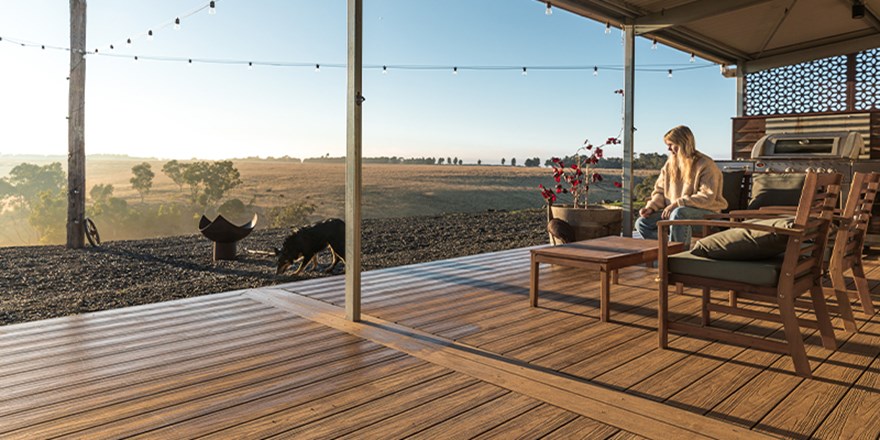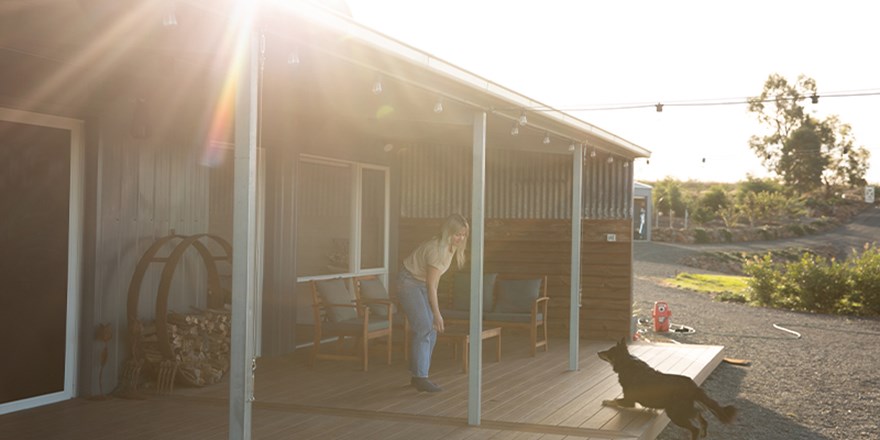Composite decking’s Eco-credentials
Is composite decking eco-friendly?
Few things are better than sitting on your deck and watching the sun go down while basking in the glow of nature.
An outdoor decking area is a great way to create a natural flow from the indoor to outdoor areas of your home and bring you that little bit closer to nature.
So, if you’re considering adding a deck to your property, it’s only right that you consider the effect your project will have on nature itself. And that all starts with making sure you’re choosing the most eco-friendly decking materials.
While traditional hardwood decking may seem appealing, it brings with it a number of downsides. Not least are the environmental effects.
The use of tropical hardwoods, which have been traditionally popular for decking timber, can contribute to rainforest deforestation and habitat degradation. Using sustainably sourced fast-growth timber from ethically managed plantations is a step in the right direction. However, it can often be difficult to ensure that timber branded as sustainable is actually sourced or harvested sustainably.
So, what’s the alternative to timber decking?
In recent years, composite decking materials have become increasingly popular as an alternative to timber decking. As technology has progressed, these products have become cheaper, more durable and, most importantly, more eco-friendly.
However, debate remains about how environmentally friendly composite decking is compared with traditional wooden decking.
So, let’s have a look at some of the environmental benefits that come with using composite decking materials.

Recycled Base Materials:
Composite wood decking represents an excellent alternative to traditional wood decking. Engineered to look and feel like natural timber, composite decking offers many of the benefits of timber decking without the adverse environmental effects.
Sustainable composite decking boards are made from recycled timber and plastic products.
Composite boards use reclaimed timber, sawdust and other wood waste that would otherwise end up in landfill or in an incinerator. Not only does this help to reduce the volume of material going to landfill, it also reduces demand for virgin wood. This helps reduce deforestation and habitat degradation, preserving the world’s forests and lowering reliance on logging and timber plantations.
And it’s not just timber. Composite decking products also include a range of recycled plastics including plastic bottles and other waste materials containing HDPE plastic.
Composite decking boards are particularly beneficial when it comes to recycling plastic bottles. Generally, plastics can only be down-cycled. This means that plastic bottles, for example, cannot be recycled back into plastic bottles. They can only be recycled into lighter plastic materials. With the advent of recycled building materials, plastic bottles can now be up-cycled into products like composite decking boards.
Recycling these products into decking boards helps to keep huge amounts of plastic out of landfill. It also helps to reduce the amount of plastic washing into the ocean since these plastics are being given a second useful lease on life.

Eco-Friendly Manufacturing Process:
The manufacturing process for composite decking boards is also important to its eco-credentials. If a product uses a lot of recycled materials but also requires high energy input for manufacturing or toxic chemicals for processing, this can offset the benefits of recycling the materials.
High-quality composite decking products are made using an eco-friendly manufacturing process. Unlike pressure-treated wood, no toxic chemicals are used to treat the materials. The manufacturing process uses minimal energy and water and the few waste materials produced are able to be reprocessed to use in the production of composite boards again.
The recycled materials are carefully processed to remove impurities and ensure a high-quality product that is long-lasting and requires minimal maintenance.
Fewer Chemicals Required for Maintenance:
Composite decking requires significantly less maintenance than traditional wood decking. It doesn’t require regular oiling, painting or sealing treatments needed to maintain wood. It also doesn’t need chemical treatments to prevent damage from termites, rot and mould.
This means that composite decking requires less potentially harmful, fossil-fuel based chemicals for cleaning and maintenance, which is great for the environment.

Durable and Long Lasting:
Longevity is a key part of choosing eco-friendly building materials. The longer a product lasts, the better it justifies the energy and materials used in its manufacturing.
In general, composite decking has a much longer lifespan than traditional wood decking. Since it is more durable than wooden boards, composite decking is less susceptible to pests, rot and mould and less likely to warp, split or splinter.
This means you’ll be giving your deck a longer life and will require fewer materials for repairs or replacement.
The Eco-Friendly Choice:
So, there you have it. The combination of recycled materials, an eco-friendly manufacturing process, low maintenance requirements and a long lifespan means that composite decking is the choice for any environmentally conscious home owner.
You may also like

Get started with Ekodeck
Experience our entire colour range for yourself. We deliver a sample kit complete with each colour direct to your door.
